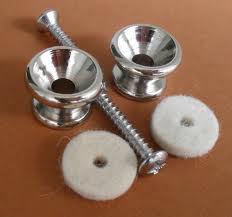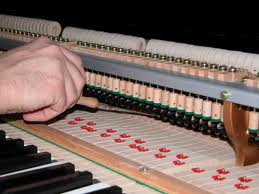
When pianos were first produced, manufacturers noticed that bridges often broke away from sounding boards. The tension caused by the strings was simply too strong for the bridge to withstand, and even the most powerful glues available were not hearty enough to handle the pressure. Some manufacturers attempted to correct this issue by securing steel screws between the piano’s ribs, through the sounding board and into the underside of the bridge. Unfortunately, the hard metal screws were simply pulled from the soft spruce sounding board as soon as the bridges snapped.
Finally, manufacturers started securing the screws by passing them through maple buttons. This method not only proved to be a reliable option – but this practice is still widely used by top quality piano manufacturers today.
One thing to keep in mind as you choose a grand piano is that many manufacturers attempt to 
Here at Cooper Piano, we take it one step further. Instead of securing bridges with buttons and screws, we use strong maple dowels dipped in powerful glue. The result is a clean, smooth sound without any chance of vibrations from loose screws and ribs. As I’ve mentioned before – a piano made from top quality parts is sure to last you much longer and reduces the chance of paying for expensive repairs or replacements down the line.
What other improvements have you seen in the construction of top quality pianos? Would you prefer a piano that is less expensive, or one that will last longer?






